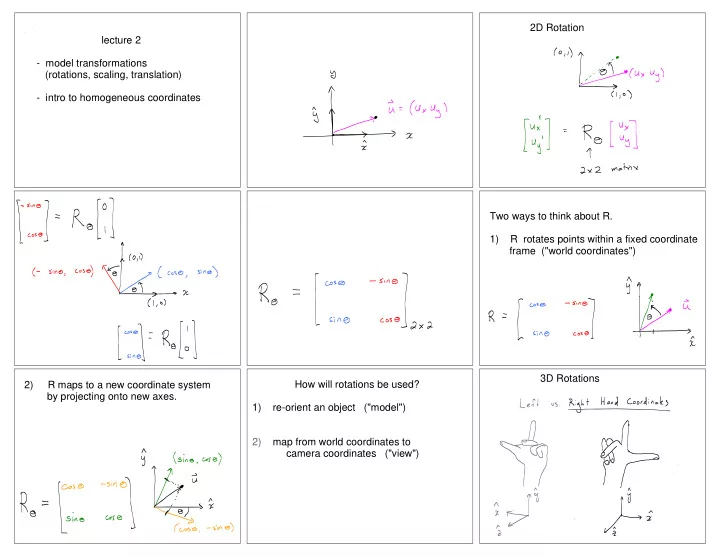

2D Rotation lecture 2 - model transformations (rotations, scaling, translation) - intro to homogeneous coordinates Two ways to think about R. 1) R rotates points within a fixed coordinate frame ("world coordinates") 3D Rotations 2) R maps to a new coordinate system How will rotations be used? by projecting onto new axes. 1) re-orient an object ("model") 2) map from world coordinates to camera coordinates ("view")
Example: rotate about z axis counter-clockwise (assuming eye is looking in the -z direction and the coordinates are righthanded)
ASIDE: Representations of rotations Problem Example 4 (very important for Computer Animation) Find a rotation matrix that rotates by around an axis and that is composed of a sequence 1) Axis-Angle -> OpenGL's glRotate() of rotations only around axes 2) Euler angles (Rz Rx Ry) Example solution: (think this through for yourself ) 1. Rotate around x axis to bring p to the xy plane. 3) Quaternions 2. Rotate around z axis to bring p to the y axis. 3. Rotate by around y axis. 4. Apply inverse rotation of 2. https://www.youtube.com/watch?v=syQnn_xuB8U&list=PL2y2aRaUaygU2zXme_Z11GyJUslwgaeUD 5. Apply inverse rotation of 1. https://www.youtube.com/watch?v=zc8b2Jo7mno
Trick: use a 4th coordinate. This is called a "homogeneous coordinates" representation. Homogeneous Coordinates Careful: In computer graphics, we always use a 4D We represent (x,y, z) by (x, y, z, 1). representation to transform points. Now define an equivalence: (x, y, z, 1 ) (w x, wy, wz, w) for any w 0. This takes each line { (wx, wy, wz, w) } in R^4 and associates it with the 3D point (x, y, z). The above is an abuse of notation. It is meant to express that: rotation scaling
Recommend
More recommend